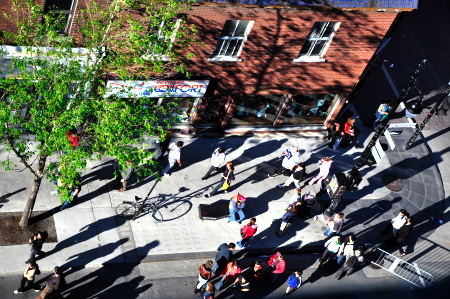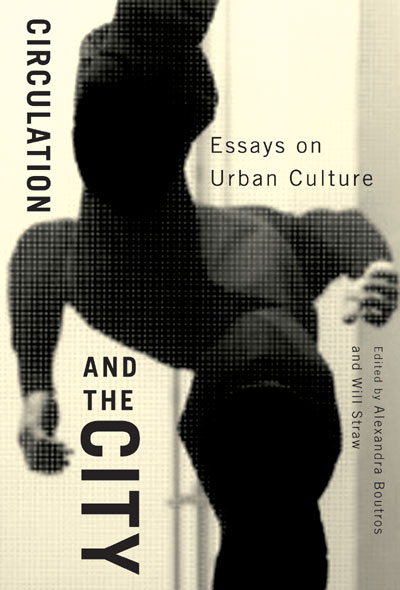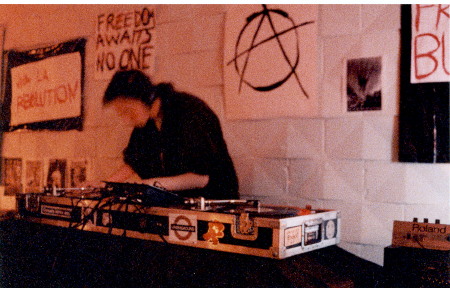With appropriate fanfare & deep bows, Will Straw & Alexandra Boutro’s edited volume entitled Circulation and the City: Essays on Urban Culture (McGill Queen’s UP, 2010) now graces the shelves. This book has been quite a few years in the works. The earliest drafts I have of work for the volume date back to 2005, and by the time we went to press, the final chapter I submitted on Henri Lefebre, rhythm, and revolution in the city had been transformed entirely from the words originally writ on rave culture and rhythm (funny thing: the new article I am finishing for Dancecult picks up on these earlier themes – sometimes work must encounter different sets of theoretical concepts, and years of reflection, for the excavation of the intellect to yield its bounty). The book forms the third in a trilogy of publications from the Culture of Cities Project, a multi-university research endeavour that sought to unearth “the mix of universal and local influences in the everyday life of cities,” with research concentrated in Toronto, Berlin, Dublin and Montréal, and with researchers across Canada and the Continent. So, with the intent of lurking y’all into picking this up (or perhaps unwittingly scaring you off), I offer the introduction to my chapter “Cities of Rhythm & Revolution.”
Posts Tagged ‘Lefebvre’
Cities of Rhythm & Revolution
Monday, March 8th, 2010the city be the rhythm invisible (rhythm II)
Monday, August 31st, 2009
in the shadows of the urban (I)_ MTL. photo: tV
Henri Lefebvre’s last work, published posthumously, and intriguing as it is something of a skeletal meditation, is entitled Rhythmanalysis. In it Lefebvre advances two hypotheses, each unique, urgent, and radical in scope. The first, following from The Urban Revolution, is that the engine of history, so to speak, is no longer the economic base, by which Lefebvre upends the Marxian hypothesis that the means of production drive the social production of history and class. Lefebvre instead posits the urban: the urban, in itself, constitutes a breakdown between city and country, between the means of production and the superstructure. The urban is a new, epochal and thus world historical condition – a virtual set of possibilities – encompassing the ‘urban revolution’, which for Lefebvre retains its open, virtual – and thus ateleological – futurity. This thesis, nascent in Lefebvre’s work of the early ’60s (and with the SI), comes into its own in Rhythmanalysis, wherein a second hypothesis takes shape: that the urban can be read, can be analysed, by a kind of phenomenology of rhythm, a phenomenology or psychoanalysis of the urban condition.
Unlike the sociological interpretation of Lefebvre – in which the ‘urban’ is seen as an architectural phenomena of the city’s expanse, of the suburb, and in which Lefebvre’s work is thus dated to the level of a (now dated) sociological fact – I am intrigued by the broader philosophical purchase of Lefebvre’s thought on the urban and rhythmanalysis.
fear of a wet planet: rhythm I
Monday, August 24th, 2009
Drexciya (descending AfroMer)
We should linger here for a long while on rhythm: it is nothing other than the time of time, the vibration of time itself in the stroke of a present that presents it by separating it from itself, freeing it from its simple stanza to make it into scansion (rise, raising of the foot that beats) and cadence (fall, passage into the pause). Thus, rhythm separates the succession of the linearity of the sequence or length of time: it bends time to give it to time itself, and it is in this way that it folds and unfolds a “self.” (Nancy, Listening 17)
What might philosophy do with rhythm? There are three cardinal points I can think of in regards to rhythm: (1) the chapter on the Refrain in A Thousand Plateaus; (2) Lefebvre’s posthumously published work on Rhythmanalysis; and (3) Nancy’s work on rhythm in Listening. There are, of course, other writings on the topic, but these three examples are cardinal points as they mark out different approaches (mind you, within a late Western philosophy – we’ll get to Afrofuturism). In this post I’ll tackle something of D&G.
music as an organisational principle: resonance
Thursday, August 20th, 2009Revolutionary movements do not spread by contamination but by resonance. Something that is constituted here resonates with the shock wave emitted by something constituted over there. A body that resonates does so according to its own mode. An insurrection is not like a plague or a forest fire – a linear process which spreads from place to place after an initial spark. It rather takes the shape of a music, whose focal points, though dispersed in time and space, succeed in imposing the rhythm of their own vibrations, always taking on more density. To the point that any return to normal is no longer desirable or even imaginable. (The Coming Insurrection 13)
As of 2009, the suspected authors of this lively and at times satirically brilliant text – in the best tradition of insurrectionist French theory, a nod to Voltaire – are still facing charges, some released from prison, others being held & questioned. Any following critical comments are critical only insofar as they applaud the force of this text.
Yet – and there is a yet with this text – something of the darkly humorous & inventive tone is lost by the time the text announces, in a rather didactic fashion, its prescriptions for action as a way of closure. These prescriptives are a tad too prescriptive for me. And I think in this passage all of what invigorates me – yet frustrates me – can be heard.







 RT
RT 